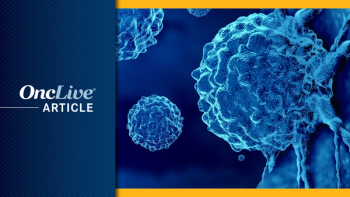
Neoadjuvant Enfortumab Vedotin Demonstrates Encouraging Activity in Cisplatin-Ineligible Muscle-Invasive Bladder Cancer
Enfortumab vedotin produced promising antitumor activity when used as neoadjuvant treatment in patients with muscle invasive bladder cancer who were not eligible for cisplatin.
Enfortumab vedotin (Padcev) produced promising antitumor activity when used as neoadjuvant treatment in patients with muscle invasive bladder cancer (MIBC) who were not eligible for cisplatin, according to preliminary findings from cohort H of the phase 1b/2 EV-103 trial (NCT03288545) presented during the
Investigators reported a pathological complete response (pCR) rate of 36.4% (95% CI, 17.2%-59.3%) among those treated with enfortumab vedotin (n = 22), as well as a pathological downstaging (pDS) rate of 50.0% (95% CI, 28.2%-71.8%).
“This first disclosure of data supports the ongoing phase 2 and 3 programs evaluating enfortumab vedotin alone or in combination with pembrolizumab in MIBC,” Daniel Petrylak, MD, professor of medical oncology and urology at the Yale Cancer Center, said in his presentation of the data.
Eligibility required patients to be ineligible for cisplatin, have clinical T2-T4N0M0 disease, and no upper tract or urethral tumors. Additionally, a urothelial carcinoma histology of greater than 50% was required. Patients also needed to have an ECOG performance status of 0 to 2, be medically fit for radical cystectomy plus pelvic lymph node dissection and have undergone transurethral resection of bladder tumor within 90 days of the first day of cycle 1.
Patients received 1.25 mg/kg of neoadjuvant enfortumab vedotin monotherapy on days 1 and 8 per 21-day cycle for 3 cycles. Within 4 weeks of treatment, patients underwent radical cystectomy plus pelvic lymph node dissection followed by imaging every 12 weeks for the first 2 years and then every 24 weeks after.
The primary end point was pCR by central pathology review. Secondary end points included pDS by central review, event-free survival, disease-free survival, overall survival, safety, patient-reported outcomes, and biomarkers.
The median age of the study population was 74.5 years. All patients were White, and most patients were male (90.9%) and a current or former smoker (95.5%). Most patients had an ECOG performance status of 0 (59.1%) followed by 1 (36.4%) and 2 (4.5%).
The most common reason for cisplatin-ineligibility was creatine clearance between less than 60 to 30 or more mL per minute (50.0%), followed by grade 2 or greater hearing loss (40.9%). A total of 86% of patients completed all 3 cycles of neoadjuvant therapy.
Any grade enfortumab vedotin–related treatment emergent adverse effects (TEAEs) were seen in all patients, with common TEAEs including fatigue (45.5%), alopecia (36.4%), dysgeusia (36.4%), diarrhea (27.3%), nausea (27.3%), peripheral sensory neuropathy (27.3%), dry eye (22.7%), and maculopapular rash (22.7%). Four patients experienced grade 3 or higher TEAEs, and no grade 4 TEAEs or deaths were reported. Grade 3 TEAEs related to treatment with enfortumab vedotin included asthenia, dehydration, erythema multiforme, and hyperglycemia.
Three enfortumab vedotin–related TEAEs leading to dose interruptions, 2 TEAEs leading to dose reductions, and 3 TEAEs leading to discontinuations were observed in the safety analysis. Most AEs of special interest were grade 1 and 2. Any grade AEs of interest included peripheral neuropathy (36.4%), skin reaction (63.6%), hyperglycemia (22.7%), ocular disorder (40.9%), and infusion-related reactions (9.1%). Grade 3 or greater AEs of special interest were skin reactions (9.1%) and hyperglycemia (13.6%).
“The observed safety profile of neoadjuvant enfortumab vedotin monotherapy in patients with cisplatin-ineligible MIBC is consistent with the known AE profile of enfortumab vedotin in other settings,” Petrylak concluded.
Reference
- Petrylak DP, Flaig TW, Mar N, et al. Study EV-103 Cohort H: Antitumor activity of neoadjuvant treatment with enfortumab vedotin monotherapy in patients (pts) with muscle invasive bladder cancer (MIBC) who are cisplatin-ineligible. J Clin Oncol. 2022;40(suppl 6):435. doi: 10.1200/JCO.2022.40.6_suppl.435



































